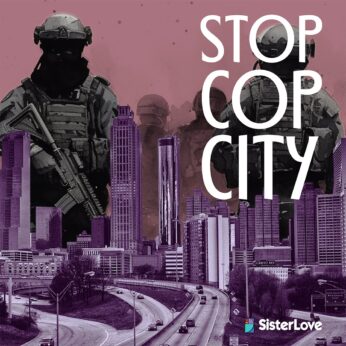
ATLANTA—An ongoing political and environmental struggle is brewing in Atlanta known as “Stop Cop City.” This catchy alliterative phrase refers to a fight by racial justice, environmental, and social movement activists to stop the construction of a police training facility, which is being spearheaded by the Atlanta Police Foundation (APF).
The facility would not just be used by police in Georgia, however; it would be a hub for militarized law enforcement training for the whole region. According to the Atlanta Community Press Collective (ACPC), “an open records request shows that 43% of trainees for the proposed Cop City police training facility would come from outside of Georgia.”
In order to build Cop City, the APF has already started cutting down over 300 acres of the South River Forest, also known as Weelaunee Forest. The latter designation originates from the Muscogee Tribe’s name for the wooded area they used to occupy before settlers forced them to Oklahoma on the Trail of Tears. The planned training facility would replace a tranquil forest with shooting and bomb ranges and fake neighborhoods for officers to practice conducting raids.
Since its announcement in 2021, resistance to Cop City has been strong, and with that, there has been heavy police repression against those who have become involved. So far, police have arrested 42 “forest defenders,” with dozens facing domestic terrorism charges. Legal challenges have been filed against these charges by lawyers, including Stanley L. Cohen, who calls the indictments “fundamentally unconstitutional” and frames them as a scare tactic rather than a true legal charge.
More notably, officers in the Georgia State Patrol killed a protester occupying the forest in January, nicknamed “Tortuguita” within the broader movement. In late May, police arrested three organizers of the Atlanta Solidarity Fund, or Sol Fund for short. Sol Fund is a bail fund specifically for those arrested in connection to Stop Cop City actions.
In a heavily-armed SWAT raid, police targeted the organizers for supposedly committing the crimes of charity fraud and money laundering. Similar to the domestic terrorism charges, the targeting of the bail fund organizers is seen by many as bogus. As put by Lauren Regan, the executive director of the Civil Liberties Defense Center, “There is absolutely not a scintilla of fact or evidence that anything illegal has ever transpired” in Sol Fund activities.

While $60 million of the funds required for Cop City would come from the APF, the City of Atlanta will also be footing part of the bill with tax dollars. The city government originally stated that the public price tag would be $30 million, going back to then-Mayor Keisha Lance Bottoms’ announcement of the site in 2021.
Combined, that means at least $90 million would be spent on the development. However, public information about the site has been anything but transparent, and reporting by the ACPC has dug up scandalous information regarding the true story behind the money fueling Cop City.
First, it seems as though the APF is having trouble raising the money it first promised for the project. Minutes from a Feb. 8 meeting between the APF board and DaVinci Development Collaborative, LLC, the firm handling the construction of the site, revealed the APF trimmed the total price tag to $72.8 million, cutting plans for a horse stable, dog kennels, and an emergency vehicle operations course.
Secondly, Atlanta taxpayers may be shoveling out more than the $30 million presented by Mayor Andre Dickens. Additional hidden payments have been discovered buried deep in the contracts written in the lease for the land to APF, as well as the ordinance for funding the site, which was proposed by council members Dustin Hillis and co-sponsored by Byron Amos, Marci Collier Overstreet, Howard Shook, Matt Westmoreland, and Mary Norwood.
The ordinance allows Dickens to sign a leaseback agreement with APF making the City liable for annual payments. These payouts would see Atlanta giving APF $1.2 million a year for the next 30 years, bringing the total taxpayer cost to $67 million—$37 million more than the figure fed to the public over the last two years.
The fine print goes even further. The most recent plans for Cop City include a 911 center, public parkland, and fire training facilities. However, none of these projects are included in Hillis’ proposed ordinance and would require the securing of future funds. According to an ACPC price estimate, these three projects alone could have a price tag of over $30 million, meaning eventually Atlanta taxpayers will be dishing out over $90 million to build Cop City.
On the day the Hillis’ ordinance to transfer money from the FY23 budget for the construction of Cop City was to be proposed, over 200 residents showed up at City Hall. Exercising their First Amendment rights, they provided public comments to the council. Out of those 200 speakers, not a single one spoke in favor of Cop City. Despite this democratic outpouring of opposition, Hillis and the co-sponsors still proposed Ordinance 23-0-1257.
Once a financial ordinance is proposed in the city council, the next step is for the finance committee to review the language and policy in order to make sure it is legal and coherent. While fewer residents came to speak at the meeting of the finance committee, chaired by Council Member Alex Wan, many still raised their voices against the passage of the ordinance. The finance committee approved the ordinance, and it moved on to its final step: a full vote in front of the entire council.
June 5th, the day of the city council vote, started as many Atlanta summer mornings do—slightly cool with hints of warm air, the sun creeping up as the minutes ticked on. Atlanta community members gathered as early as 9:00 A.M. to sign up for public comment, which does not open until 11:00 A.M. However, upon arrival, the police working security at City Hall informed them they could not enter until 11:15.
Some began to chant, demanding to be let in, while others spoke individually with police to negotiate terms of entrance. Eventually, the police conceded and let people start entering the lobby in a single file line. When sign-ups eventually opened, the line weaved down the stairs and zig-zagged through the main lobby in what appeared to be a never-ending spiral.
In total, 350 speakers signed up before the list was closed at 1:00 P.M. However, more Atlantans eager to speak were shut off outside city hall on account of the fire code, which only allowed a certain number of individuals to enter the building. Attendees unable to enter came up with an impromptu plan: throwing a spontaneous rally outside the front entrance, complete with banners, speakers, and of course, more chanting.
Twelve hours and 350 public comments later, with over 99% opposing Cop City, the city council was almost ready to wrap up its public comment session. Before moving on with the agenda, the council did grant an extra hour to those who were in city hall but unable to sign up before public comment was closed. It was not nearly enough time, however, for the 100+ people still waiting to speak, so another hour extension was granted.
But in the end, it was as though the 14+ hours of speakers speaking out against Copy City never happened. In a vote of 11-4, the council approved funding for the facility.
Stop Cop City organizers are now laying out their next plan of action, a city-wide referendum in which Atlanta residents will be able to choose for themselves whether Cop City will be built. The announcement of this plan came the morning of Wednesday, June 7, barely 24 hours after the city council vote.
Community organizers have 60 days to collect 75,000 signatures; if they’re successful, Cop City will be up for a direct vote on the ballot in November. Members of the referendum coalition have created the website copcityvote.com, where Atlanta residents who voted in the 2022 election will be able to register to receive a physical copy of the referendum, which they then must send in to be counted.












Comments